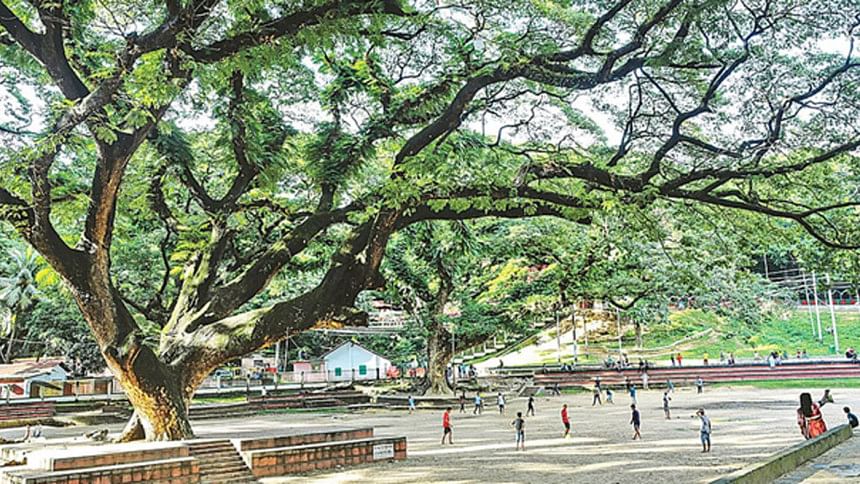Ecocidal Project at CRB, Chattogram: Greed over Green!

In "Tintern Abbey", William Wordsworth, the best known English romantic poet, gives advice to his sister Dorothy Wordsworth to love nature because, "Nature never did betray the heart that loved her." As nature is the supreme power on earth, any disturbance to its harmony and symmetry leads to dire consequences. But the Ministry of Railway seems to be totally unaware that its agreement with United Group under Public-Private Partnership (PPP) to build commercial infrastructure on the premises of Chittagong Railway Building (CRB), a heritage site listed by Chittagong Development Authority (CDA), will be detrimental to its ecosystem.
The people of Chattogram have always welcomed development initiatives by the government, and co-operated wholeheartedly. Here the point in question is not the project, but the site designated for the project implementation i.e., CRB which is metaphorically called the lung of Chattogram. Hundreds of visitors flock to this idyllic place every day to breathe fresh air, and pass a few tranquil moments under the shade of the centenarian trees Therefore, if massive commercial structures are being built at CRB, the people of Chattogram have a valid reason to protest against the impending ecocide.
Built on a hilltop in 1872 as the headquarters of the Assam-Bengal railway, the Chittagong Railway Building (CRB) is impressive for its typical British architecture and gaudy crimson colour. It is one of the remaining symbols of colonial history, and is listed among the heritage sites of the CDA requiring "preservation and conservation for historical, architectural, environmental or ecological point of view". Moreover, CRB has special attractions for city dwellers due to its prime location and serene environment.
Though not a very well furnished modern leisure spot, CRB has its own features. Mornings at CRB are marked by joggers who jog on specially made walkways, and the afternoons are vibrant with visitors of all ages. Shirishtala, the centre of CRB, often gets filled with children as it is an ideal ground for short pitch cricket and six-a-side football. Moreover, there is a muktamancha which offers an extraordinary platform for cultural activists to organise cultural programmes and seasonal celebrations. Another amazing point is where the seven serpentine paths converge into one. This increases the scenic beauty of CRB unimaginably.
There are, however, a few other recreation places in Chattogram which include, among others, Shishu Park in front of the Circuit House, Biplob Udyan at Sholoshahar, the outer stadium adjoining the Zahur Ahmed Chowdhury Stadium, and DC hill. These have failed to draw expected visitors due to their poor conditions, decreasing quality of facilities and unnecessary restrictions. This is also a good reason for CRB's increasing popularity. Therefore, when the authorities recently launched their construction work by evicting residents from the Railway Hospital Colony quarters, people from all walks of life protested.
A recent Daily Star report informs that Bangladesh Railway (BR) signed an agreement with United Group under Public Private Partnership (PPP) on March 18, 2020. According to the agreement, the Group would build a medical college, a 500-bed hospital and a nursing institute at CRB. According to United Group, the project will be implemented in a six-acre land leased by the railway for 50 years. It also states, "The hospital will provide healthcare services to Bangladesh Railway employees at a discounted rate". It is not, however, justifiable that another luxury hospital is required when there is already a hospital for the railway officials and employees in CRB area and interestingly enough, "some 80 percent of the hospital beds are now empty".
The environmentalists and distinguished people of Chattogram opine that CRB cannot afford to take the burden of such a mammoth project which will inexorably encroach on its exquisite natural beauty. If the project is implemented—it is feared—the prevailing tranquillity at CRB would diminish, trees will be replaced by traffic congestions, and the fresh air would be polluted by carbon monoxide. Furthermore, the amazing glades through which exotic animals stride at night would turn into garbage dumping zones, and honking of vehicles would be heard instead of the sweet songs of the nightingale. The whole CRB will transform into a commercial hub—let's think of the CMCH environs now. All this means that the CRB will lose its attraction as an oasis among the bustle of the city, and people of Chattogram will lose a "breathing space".
It is to be noted that environmentalists have already suggested an alternative site for the project which is an abandoned cardiac hospital and its surrounding 10 acres of land at Kumira situated on the outskirts of the city. But the railway high-ups don't seem to be giving heed to the suggestion, and are adamant about the CRB project.
Since the signing of the agreement, people of all levels and professions have strongly resented the Railway's commercial deal with United Group. Even the workers' organisations of Bangladesh Railway have been protesting the project in the area. They submitted a memorandum to the prime minister recently requesting for revision of the project site. Many organisations including Bangladesh Environmental Lawyers Association, Bangladesh Poribesh Andolon and Association for Land Reform and Development have issued legal notices to the relevant authorities, and demanded that CRB be declared a "special biodiversity conservation area" under existing laws.
It needs to be clarified that the people of Chattogram have never been apprehensive about the government's continuing development initiatives. What they want is ecologically sustainable development to live in harmony with nature. We trust that the Ministry of Bangladesh Railway and the Public-Private Partnership Authority would reassess this project, and take judicious decisions. For the people of Chattogram, CRB with its lush greenery is more life-giving than the greed driven ecocidal health infrastructure being planned.
Muhammed Rukan Uddin is professor, department of English, University of Chittagong.
Email: [email protected]

 For all latest news, follow The Daily Star's Google News channel.
For all latest news, follow The Daily Star's Google News channel. 



Comments